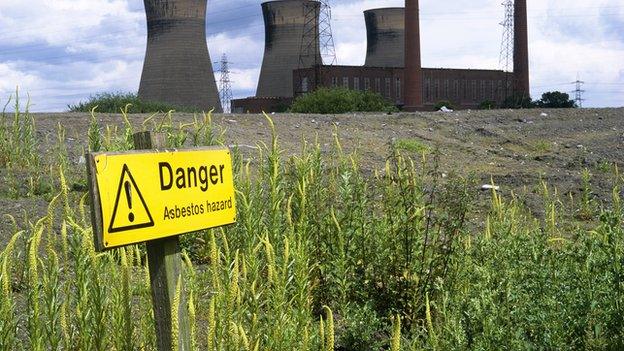Why insurers should fund medical research
- Published

Financial belts are being tightened in many areas - including medical research. But scientists say funding for such work is crucial, for the UK's research industry as well as for patients.
In this week's Scrubbing Up, Dr John Moore-Gillon, a respiratory health expert and honorary medical adviser at the British Lung Foundation, suggests the solution in the case of the asbestos-related cancer, mesothelioma, could be to turn to the insurance industry - and that this could be a model for supporting other areas of research.
Each year, the insurance industry pays out hundreds of millions of pounds in compensation to people who have developed mesothelioma - a cancer of the outer covering of the lung - as a result of exposure to asbestos at work.
With the UK having the highest rates of mesothelioma in the world, it is estimated that these payments will cost the insurance industry in excess of £11bn over the coming years.
A far more profound cost is borne, though, by those actually living with this often very painful disease.
With no cure and little by way of effective treatments, mesothelioma can act with devastating speed.
Fewer than one in 10 sufferers are alive just three years after diagnosis, and many survive just a matter of months.
'Loose change'

Mesothelioma is a cancer of the outer covering of the lung
Compensation can help a family cope financially, but nothing makes up for the loss of a loved one.
Well-funded medical research is essential if this situation is to improve - but such funding remains shamefully low, with that for mesothelioma lagging well behind levels invested in diseases, like skin cancer, that kill similar numbers of people.
With about 60,000 people expected to die of mesothelioma in the UK over the next 30 years unless new treatments are found, the need to address this funding shortfall is urgent.
But with public finances still tight, the key question is: how can we afford this extra investment without cutting back elsewhere?
One solution is to work with the insurance industry. If, each year, insurers invested in mesothelioma research just a tiny fraction of the amount they will end up paying out in compensation - for example, just 0.05% of that £11bn - it would absolutely transform mesothelioma research.
What is loose change for a multi-billion pound global industry could prove life-saving for thousands.
And what is more, as treatments improve, and more mesothelioma patients live healthy, fulfilling and economically productive lives, the amount of compensation insurers would have to pay out would fall.
It's a win-win situation that should save the industry money.
'An outstanding opportunity'
This principle of turning potential private sector beneficiaries into benefactors may sound unorthodox.
However, I believe such approaches to medical research funding will be crucial in future, not only to cope with the burgeoning health problems presented by our ageing population and modern lifestyle, but to ensure that diseases like mesothelioma aren't neglected.
Of course, it wouldn't address all our research-funding needs, across all disease areas.
And making it work will require a level of co-operation between politicians and industry that, frustratingly, we haven't yet seen for mesothelioma, even though both sides publicly support a deal.
However, with mesothelioma, we have an outstanding opportunity.
If government and industry pass this test, it may not only help the tens of thousands of people who will otherwise die of mesothelioma over the coming years it could also fundamentally change, in the long term, the way we think about funding medical research.
- Published25 March 2014

- Published14 April 2014

- Published13 March 2014

- Published1 March 2014

- Published16 January 2014

- Published13 January 2014
